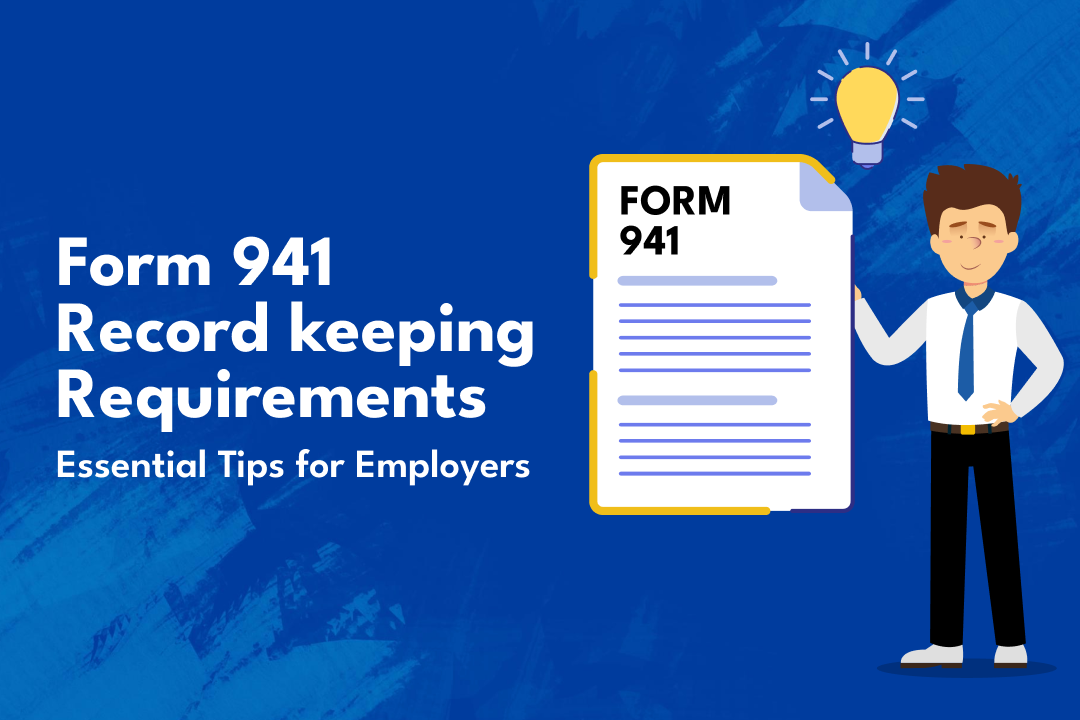Unlock the secrets to stress-free tax compliance with our essential Form 941 Recordkeeping Requirements guide! Discover how proper recordkeeping can streamline your tax filing process, maximize tax credit claims, and support informed financial decisions. From organizing employee payroll records to utilizing digital tools, we’ll equip you with the skills to excel in recordkeeping and unleash the full potential of your business’s financial success.
As an employer, navigating the intricacies of tax reporting can be challenging, but fear not – we have the ultimate guide to streamline your Form 941 recordkeeping. In this blog, we’ll uncover the importance of maintaining meticulous records, explore the significance of Form 941, and equip you with essential tips to easily conquer tax compliance.
Get ready to unleash the power of proper recordkeeping, maximize tax benefits, and elevate your financial prowess like never before. Say goodbye to tax-related stress and hello to a seamless tax season with our essential tips for employers!
Let’s dive in and embark on a transformative journey to tax mastery.
Understanding Form 941 Recordkeeping Requirements
Explanation of Recordkeeping Requirements by the IRS
The IRS places significant emphasis on recordkeeping for employers filing Form 941. Proper recordkeeping is essential to ensure accurate and transparent tax reporting. According to IRS guidelines, employers must maintain records that support the information reported on Form 941, including:
- Employee Information: Keep records of each employee’s full name, Social Security Number (SSN), and address.
- Wages and Hours: Maintain records of employee wages, tips, and other compensation, as well as the hours worked by each employee.
- Withholding Allowances: Document each employee’s withholding allowances claimed on Form W-4.
- Tax Deposits: Keep track of the tax deposits made, including the dates and amounts of each deposit.
- Tax Credits: Maintain documentation for any tax credits claimed, such as the Work Opportunity Tax Credit (WOTC) or Employee Retention Credit (ERC).
- Adjustments: Record any adjustments made to previously filed Forms 941.
- Fringe Benefits: Document any fringe benefits provided to employees.
- Termination Records: Keep records of terminated employees, including the date of termination and final wages paid.
Retaining these records for at least four years after the due date of Form 941 or the date the taxes were paid, whichever is later, is crucial. Proper recordkeeping ensures compliance with IRS regulations and provides a reliable audit trail in case of IRS inquiries or tax audits.
Related Article: All You Need To Know About IRS Form 941: An End-To-End Guide
Essential Tips for Effective Form 941 Recordkeeping
Proper recordkeeping is the backbone of a well-organized and compliant business. When it comes to Form 941, efficient recordkeeping ensures smooth tax reporting, supports accurate tax credit claims, and protects your business from potential IRS inquiries. Here are essential tips for mastering Form 941 recordkeeping:
Organizing and Storing Records: Best Practices
- Centralize Your Records: Designate a dedicated physical or digital space to store all Form 941-related documents. Keep records organized by quarter and year for easy retrieval.
- Time-Stamping and Dating: Date-stamp physical documents upon receipt and utilize digital recordkeeping tools with automatic time-stamping features to ensure accurate and up-to-date records.
- Consistent Naming Convention: Develop a standardized naming convention for digital files, incorporating relevant details such as the quarter, year, and record type. This simplifies searching and sorting.
- Separate Personal and Business Records: Maintain a clear distinction between personal and business financial records to avoid confusion and streamline tax reporting.
Utilizing Digital Tools for Streamlined Recordkeeping
- Employ Payroll Software: Implement reliable payroll software that automatically tracks employee wages, hours worked, tax withholding, and deductions. This reduces manual data entry and minimizes errors.
- Explore Cloud-Based Solutions: Embrace secure cloud storage for digital records, providing convenient access from anywhere while ensuring data backups for peace of mind.
- Consider Mobile Apps: Utilize recordkeeping apps that enable employees to submit their data digitally, reducing paperwork and facilitating data collection.
Related Article: Common Errors to Avoid on Form 941: Tips for Accurate Filing
Employee Information and Payroll Records: Key Details to Include
- Complete Employee Profiles: Ensure accurate and up-to-date employee information, including full names, Social Security Numbers (SSNs), addresses, and withholding allowances.
- Comprehensive Payroll Records: Maintain detailed records of employee wages, tips, bonuses, commissions, and any other compensation provided.
- Timekeeping Records: Keep meticulous records of employee hours worked, including regular overtime and paid time off.
Tracking Tax Credits and Deductions: Ensuring Accuracy and Compliance
- Organize Tax Credit Documentation: Retain proper documentation to support tax credits claimed, such as certifications for WOTC-eligible employees or evidence of qualified wages for ERC.
- Stay Updated on Eligibility Criteria: Regularly review tax credit eligibility requirements to ensure compliance and identify opportunities to maximize credits.
- Reconcile Tax Credit Claims: Periodically reconcile tax credit claims with payroll records to verify accuracy and promptly address discrepancies.
Implementing these essential recordkeeping tips streamlines Form 941 reporting, maintains compliance with IRS regulations, and optimizes your tax benefits. An effective recordkeeping system simplifies tax season and empowers your business to make informed financial decisions.
Related Article: Maximizing Tax Credits on Form 941: A Guide for Employers
The Role of Recordkeeping in Tax Audits and Compliance
Accurate and organized recordkeeping is vital for smooth tax reporting and plays a significant role in safeguarding your business during tax audits and ensuring compliance with IRS regulations. Let’s explore the crucial role of recordkeeping in tax audits and compliance for Form 941.
How Proper Recordkeeping Can Ease Tax Audits
- Supporting Documentation: During a tax audit, the IRS may request records related to Form 941 filings. Proper recordkeeping ensures you have the necessary documentation to provide evidence of accurate tax reporting.
- Minimizing IRS Scrutiny: A well-maintained recordkeeping system reduces the likelihood of the IRS scrutinizing your tax returns. When you can provide complete and organized records, the audit process is more efficient, and the chances of penalties or fines decrease.
- Demonstrating Compliance: Maintaining detailed records demonstrates your commitment to compliance with tax regulations, enhancing your credibility with the IRS.
Common Recordkeeping Mistakes to Avoid
- Incomplete or Missing Records: Failing to keep all required records or missing critical information can raise red flags during an audit.
- Inaccurate or Altered Records: Altering or manipulating records can lead to severe penalties and jeopardize your business’s reputation.
- Inadequate Retention Periods: Failing to retain records for the required time can result in non-compliance, leading to potential penalties.
Ensuring Your Records Align with Form 941 Filings
- Consistency in Reporting: Your records should align seamlessly with the information reported on Form 941. Discrepancies may trigger an audit and raise suspicions.
- Review for Accuracy: Regularly review your records to ensure they are accurate and up-to-date. Address any discrepancies promptly.
- Seek Professional Guidance: If you face complex tax situations or are uncertain about recordkeeping requirements, consult a tax professional or accountant for expert advice.
A robust recordkeeping system protects your business during tax audits and instills confidence in your tax reporting practices. Adhering to IRS recordkeeping requirements and avoiding common mistakes position your business for compliance success.
Benefits of Efficient Recordkeeping for Employers
Maintaining efficient and accurate recordkeeping for Form 941 offers numerous advantages beyond mere compliance. Let’s explore the valuable benefits that employers can reap from implementing an effective recordkeeping system:
Streamlining Tax Filing and Reporting Processes
- Time and Cost Savings: Efficient recordkeeping reduces the time and effort spent on manual data entry, allowing employers to focus on core business activities.
- Seamless Tax Season: Well-organized records make tax filing smooth and stress-free, minimizing the risk of errors and late submissions.
- Improved Efficiency: Digital recordkeeping tools automate data collection and organization, enhancing productivity and saving valuable resources.
Related Article: Understanding Form 941 Payment Methods: A Guide for Employers
Maximizing Tax Credit Claims and Deductions
- Identifying Eligibility: Proper recordkeeping helps employers identify eligible tax credits and deductions, ensuring no opportunities are missed.
- Accurate Calculations: Organized records facilitate accurate calculations of tax credits, minimizing the risk of over or underclaiming.
- Compliance with IRS Requirements: Detailed records support tax credit claims during IRS audits, increasing the chances of approval.
Supporting Business Financial Planning and Decision-Making
- Informed Financial Decisions: Access to comprehensive records allows employers to make informed decisions based on accurate financial data.
- Budgeting and Forecasting: Well-maintained records aid in budgeting and forecasting, enabling better long-term financial planning.
- Audit Trail and Due Diligence: A robust recordkeeping system provides an audit trail and demonstrates due diligence, promoting financial transparency.
Strengthening IRS Compliance and Avoiding Penalties
- Compliance Confidence: Efficient recordkeeping ensures employers comply with IRS regulations, reducing the risk of non-compliance penalties.
- Audit Preparedness: Detailed records prepare businesses for IRS audits, allowing for a smooth and successful audit process.
- Enhanced Business Reputation: Strong recordkeeping practices reflect positively on a business, signaling a commitment to integrity and accountability.
Related Article: Detailed Instructions On Properly Reporting Tax Credits on Form 941
Record Retention and Document Destruction Guidelines
Proper record retention and secure document destruction are essential to effective recordkeeping practices. Let’s explore the guidelines for retaining Form 941 records and ensuring privacy and compliance through secure document destruction:
IRS Guidelines for Retaining Form 941 Records
- Record Retention Period: The IRS requires employers to retain Form 941 records for at least four years from when the tax becomes due or is paid, whichever is later. This includes all supporting documentation, such as payroll records, tax deposits, and tax credit certifications.
- Employment Tax Records: Certain employment tax records, such as those relating to uncollected Social Security and Medicare taxes, should be retained indefinitely.
- Previous Versions of Form 941: Employers should keep copies of previously filed Form 941 reports for the entire retention period for easy reference and verification.
Secure Document Destruction: Maintaining Privacy and Compliance
- Shred Confidential Documents: When disposing of physical documents, use cross-cut shredders to destroy sensitive information. This prevents unauthorized access and protects employee data.
- Digital Data Erasure: Use reputable software to permanently erase data from storage devices before disposal or recycling for digital records.
- Data Encryption: Implement encryption for sensitive digital records, ensuring data remains protected even if accessed by unauthorized parties.
- Data Access Control: Restrict access to records to authorized personnel only and use secure password management practices.
- Compliance with Data Protection Laws: Ensure document destruction practices comply with relevant data protection laws, such as the General Data Protection Regulation (GDPR) for international businesses.
By adhering to these guidelines, employers can maintain compliance with IRS record retention requirements, safeguard sensitive information, and protect their businesses and employees from potential data breaches. An effective record retention and destruction policy promote transparency, accountability, and the highest privacy standards in your business operations.



